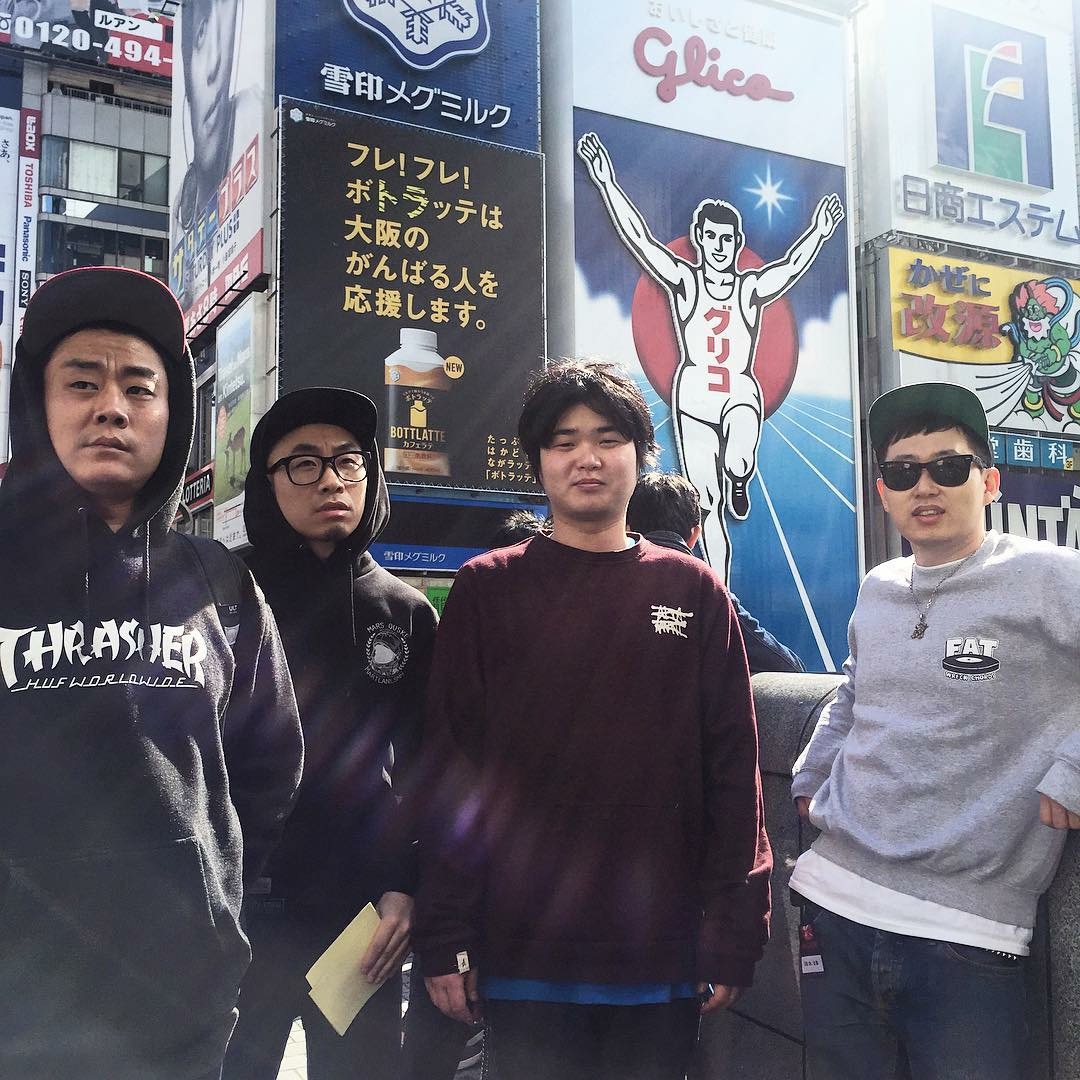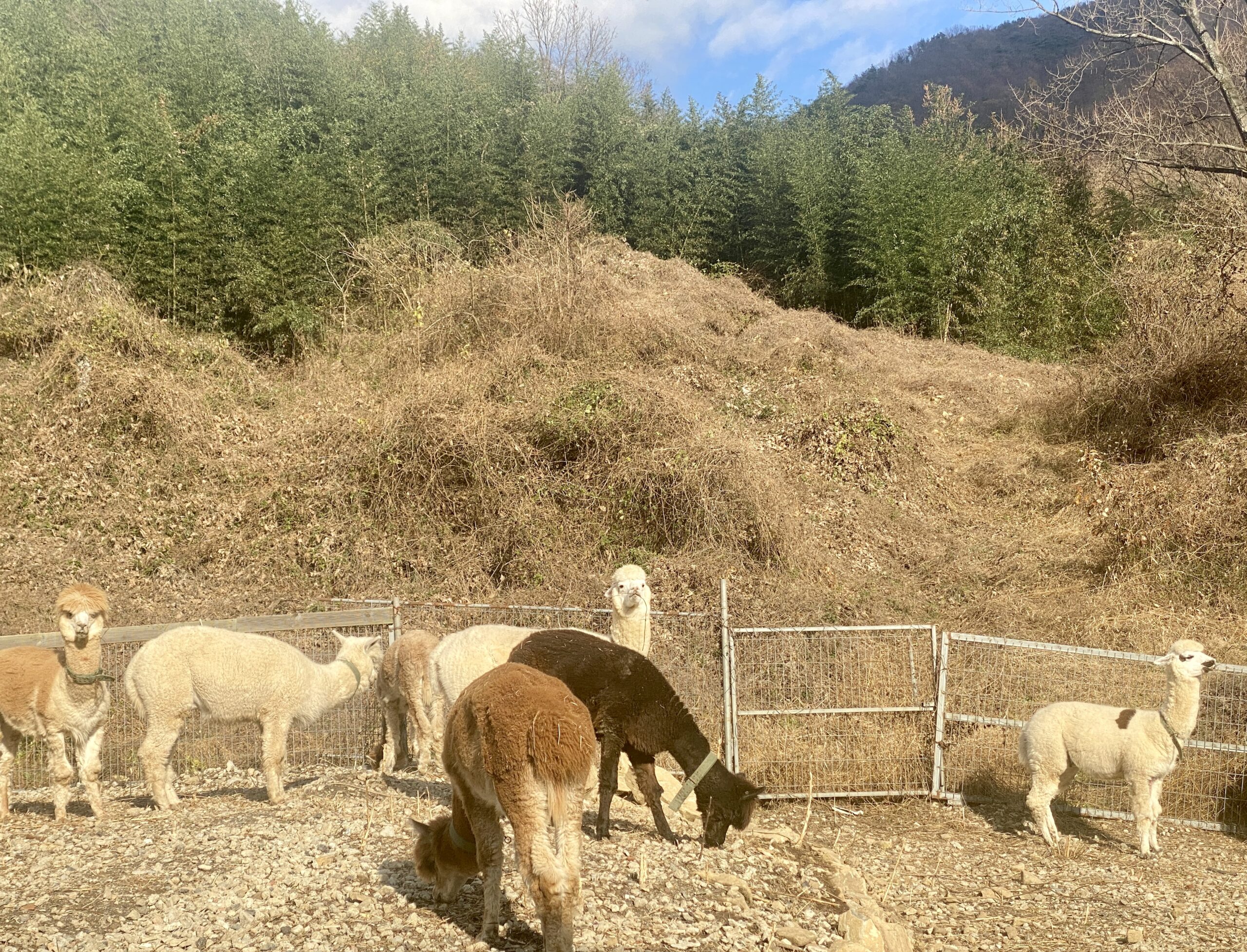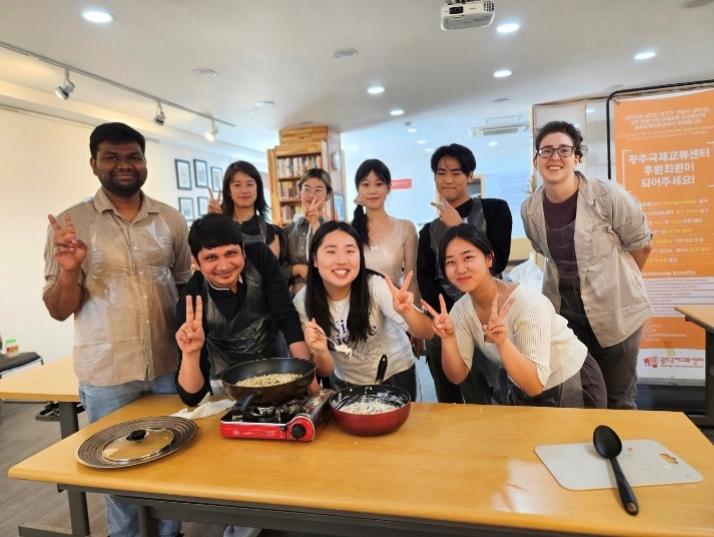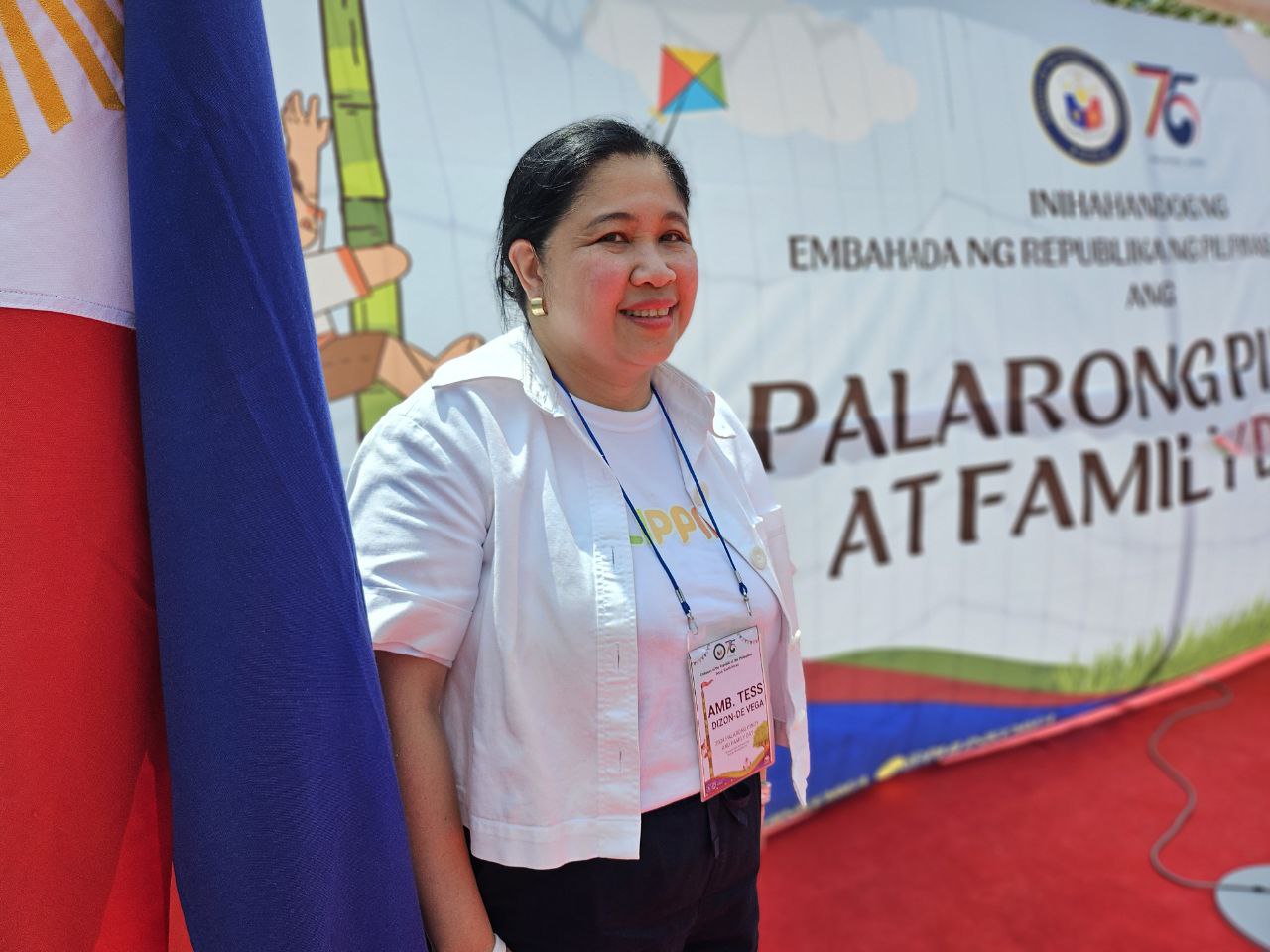Ambassador Dizon-De Vega Visits Gwangju for Filipino Family Day
In connection with her recent visit to Gwangju for the Filipino community event Palarong Pinoy at Family Day, David Richter had the opportunity to interview H. E. Maria Theresa B. Dizon-De Vega, the Philippines’ current ambassador to South Korea. The interview that follows focuses on Korea-Philippine relations.
David Richter: Today is a big event for the Filipino community, especially in the Jeollanam-do area, but there’s obviously different events taking place in different regions. Thank you, Ambassador Dizon-De Vega, for granting us the honor of this interview.
Today’s event has brought together members of the Filipino community from across Korea, making it a meaningful occasion. Could you share your reflections on visiting and engaging with the various Filipino communities active here in Korea?
Ambassador Dizon-De Vega: One of the main pillars and flagship programs of our embassy is engaging with the Filipino community in Korea. This community comprises over sixty-three thousand individuals from various sectors. The largest sector is the EPS [Employment Permit System] workers, followed by marriage migrants, who are part of multicultural families. Additionally, we have professionals, students, teachers, academics, and entertainers among the community. This diverse group underscores the importance of reaching out and engaging with all its members, especially as Korea becomes increasingly diverse and multicultural.
Projections indicate that by the end of this decade, Korea will become a fully multicultural country, surpassing the OECD’s required threshold. It is crucial for us to empower these communities by providing programs that inform them about their rights, responsibilities, and reintegration options if they decide to return to the Philippines or move elsewhere in the world.
Activities like today’s Family Day, which includes opportunities to participate in traditional Philippine games, are essential. Such events not only celebrate Filipino heritage but also aim to empower community members to be engaged and active participants in their current environments in Korea. Maintaining a connection to the Philippines is very important for us, as it helps these individuals stay connected to their roots while integrating into their new communities.
Richter: As the ambassador of the Philippines to South Korea, what unique opportunities and challenges have you encountered in fostering diplomatic relations and supporting the Filipino community?
Ambassador Dizon-De Vega: This year, we are commemorating seventy-five years of diplomatic relations with the Republic of Korea. The Philippines was one of the first countries in the world to recognize the independence of the Republic of Korea and the first ASEAN country to do so. We also participated in the Korean War. These are significant milestones in our relationship and serve as strong foundations for a dynamic and forward-looking partnership. Our relationship is built on enduring partnership and deep ties, including shared sacrifices during the Korean War. These elements have fostered stronger relations across various fields, including politics, defense and security, economics, and trade and investment, as well as cultural and academic exchanges. We also collaborate on addressing new challenges, such as food security, migration, and climate change.
Currently, our relationship is in a very positive state. We are working closely to elevate it to a strategic partnership by the end of the year. I am optimistic that we will achieve this goal.
Richter: What exactly is the type of strategic partnership you are referring to, and what is still missing until Korean and the Philippines reach that point?
Ambassador Dizon-De Vega: Well basically, a strategic partnership is a kind of status that countries enter into. Of course, you have to negotiate to lay the foundation for more active relations. It also entails an agreement to be signed by representatives of both countries. So, we’re, I think, at a very good place in terms of discussions now, and we’re both looking at concluding these discussions within the year.
Richter: The Filipino contribution during the Korean War (1950–1953) is still warmly remembered by many Koreans, and the People Power Revolution in 1986 had a profound influence on Korea’s own democratization movement. In your view, how might the Korean people further express their appreciation for the historical ties between the two nations?
Ambassador Dizon-De Vega: It is very important to highlight that at various points in each other’s histories, we have supported one another. During the Korean War, the Philippines sent 7,420 troops to Korea to help defend democracy on the Korean peninsula. Filipinos shed blood on this land, and that sacrifice forever cemented our relationship. But our support did not end there.
During the post-war reconstruction period, the Philippines was among the countries that helped Korea recover from the devastation of the war. This support is something our Korean friends have never forgotten, and I am confident they will continue to remember it. This strong foundation has allowed us to build a robust partnership now that Korea is one of the largest economies in the world – a top-ten economy and a major donor in official development assistance.
Korea has given back to the Philippines in many ways, including through development cooperation, partnerships in disaster risk mitigation, adaptation, resilience, digitization, and agriculture, among other fields. Furthermore, the People Power Movement of 1986, which partly inspired the 1987 democratic movement in Korea, has strengthened our collaboration. We have continued to build on that historical moment, working together in many areas, particularly in international diplomacy and the multilateral field. We share values such as democracy, human rights, and a rules-based international order.
Our shared historical experiences have made our relationship stronger. Today, we continue to uphold these values and support each other in promoting them.
Richter: With approximately 64,000 Filipinos residing in Korea, what areas of cooperation do you believe are most critical in further strengthening the bond between the two countries? I think you’ve already touched on some of these aspects.
Ambassador Dizon-De Vega: In terms of our people-to-people relationship, one very important aspect is our labor engagement with Korea. The Philippines is one of the primary sending countries under Korea’s Employment Permit System, which is a government-to-government program for temporary labor in various sectors, such as manufacturing, construction, agriculture, and fisheries. Labor and migration are critical areas of engagement for us, and we have regular dialogues and mechanisms to collaborate with our Korean counterparts.
We also have a Migrant Workers’ Office here, which serves as the labor office of the Philippine government, ensuring that we are fully represented in this sector. Another significant aspect of our people-to-people relations is academic and cultural exchange. We are actively cultivating these exchanges through student programs and academic partnerships. For instance, we recently launched a Philippine Studies program at Busan University of Foreign Studies and are exploring similar arrangements with other universities across Korea.
To celebrate the 75th anniversary of diplomatic ties, we are organizing a joint academic colloquium at Seoul National University. This event will highlight the research contributions of Filipino students, faculty members, and researchers in Korea. These initiatives are crucial for strengthening the bonds between our two countries.
Richter: Thank you. Next, from a practical standpoint, what roles do you see for the city of Gwangju specifically and other local organizations in assisting Filipino migrants with their settlement and integration into Korean society You already brought up that you have a lot of Filipino representation in the cities, but I’m not sure if Gwangju would have one of those.
Ambassador Dizon-De Vega: We are particularly active here in Gwangju and Jeollanam-do, where there is a growing community composed of workers, marriage migrants, and a diverse multicultural population. We are pleased that the local government in Gwangju, including the provincial government, has been very supportive of our migrant community, not only Filipinos but also other migrant groups.
Every year, we hold a Philippine festival in Gwangju, usually in this particular park, Wolcheon Park, although there have been occasions when it was held in other areas. The local government has been very supportive of these activities.
We also provide numerous consular outreach services in Gwangju. Currently, we are offering passport and marriage-related services. Our labor office is also based here, and we collaborate closely with the Foreign Residents Center, counseling centers, and shelters. We aim to maintain and strengthen these partnerships.
We have been in discussions with central government offices such as the Ministry of Labor and Employment and HRDK to seek support for additional programs of this kind. Specifically in Gwangju, we have developed a strong, productive, and positive working relationship with various centers serving the migrant community. We are very satisfied with the partnership so far.
Richter: The Philippine Embassy has played an active role in supporting the Filipino community in Korea. Looking ahead, what forms of support or initiatives do you envision the embassy offering to further enhance the vitality and welfare of the Filipino community here?
Ambassador Dizon-De Vega: When I assumed the role of ambassador in 2021, one of our key goals was to create what I like to call an “ecosystem of empowerment” for our community here. We have implemented various initiatives, including seminars on rights and responsibilities as well as post-arrival orientation seminars for workers. Last year, we also launched a post-arrival orientation seminar specifically for marriage migrants due to the recognized need for such support. We are now working to replicate this approach with student groups to further strengthen these support systems and provide them with platforms and programs that empower them through information and knowledge.
Our Migrant Workers’ Office offers annual skills training programs. These include a program in the first half of the year and an ongoing program in the second half. We collaborate with different institutions and instructors to teach new skills or upgrade existing ones.
Additionally, we have a program promoting entrepreneurship. We offer seminars for Filipinos who may eventually need to return to the Philippines. Not everyone will be allowed or choose to stay here indefinitely, so we provide options for entrepreneurship and other activities to help them fully reintegrate upon their return.
Richter: You mentioned arrival orientation seminars. I have two questions about these. Are they only held in Seoul, and are they open to any Filipino coming here or is there some type of preselection or criteria?
Ambassador Dizon-De Vega: We conduct these programs in batches. For EPS workers, we have a specific program that we offer online to ensure maximum coverage for everyone who wishes to participate. For marriage migrants, we follow a similar approach but with a more personalized touch. While we do offer online sessions, we also conduct outreach activities. For instance, one of the post-arrival orientation seminars for marriage migrants was held in Gwangju earlier this year, just before spring, at one of the universities here.
Richter: So if anybody residing in Gwangju or reading this newspaper from the Philippines would want to join, is it via the website that they could find information?
Ambassador Dizon-De Vega: Through the website and also through the official Facebook page of the Philippine Embassy and our Instagram page. So we always post there upcoming seminars and other events.
Richter: For the closing question, would you be open to attending similar events and programs in Gwangju in the future? You mentioned earlier that you come here every year, but it would be a pleasure to welcome you back.
Ambassador Dizon-De Vega: Personally, I have visited Gwangju many times for various events, and I always enjoy coming here. I believe that Gwangju has extended a welcoming hand to our Filipino community and to migrants from various countries. We hope to continue coming here and to be more active in ensuring that we have representation at events, particularly those for migrants. I will be returning to Gwangju for the Gwangju Biennale.
Richter: So, clearly, this is a major event, especially for the Filipino community, and it makes sense that you’re here. However, outside of such large or targeted events, what other types of events do you usually travel to Gwangju or other cities for?
Ambassador Dizon-De Vega: I travel to different parts of Korea quite frequently for various reasons. Some trips are related to Filipino community events, while others involve different aspects of our work, such as political, security, and maritime cooperation. I also attend trade events and expos focused on agricultural exports, seafood, gaming, digitization, and smart agriculture.
Additionally, I participate in cultural events. For example, I will be in Gwangju for the opening of the Gwangju Biennale. This year, we have a Philippine pavilion showcasing works by some of the most outstanding contemporary artists from the Philippines.
Richter: I think we’re pretty much done. One thing I’d like to add is that this event is open to everyone. Perhaps next year, we could see a few more non-Filipino migrants or even Korean people joining in and enjoying the festivities.
Ambassador Dizon-De Vega: We brought the Wish Bus to South Korea. The Wish Bus is a very popular radio platform in the Philippines for contemporary and pop music, and many of our Korean friends are familiar with it, especially those who have visited the Philippines. We held the launch event in Busan last June, and this is their second engagement here in Gwangju.
Richter: I’ll just ask one more question about that. The Wish Bus, as you mentioned, is a well-known radio platform, and I see it parked in front of us. You mentioned it was recently launched. Is this engagement part of the 75th anniversary celebrations, or can we look forward to seeing the Wish Bus in the future as well?
Ambassador Dizon-De Vega: The Wish Bus is actually the third of its kind worldwide. The original Wish Bus platform is based in the Philippines, and they launched a Wish Bus in Hollywood a few years ago. Now, they have brought one to South Korea.
In addition to showcasing Filipino talents and popular music, the Wish Bus also features some K-pop acts. It’s a very unique platform where live performances take place inside the bus. It is fully equipped and set up like a studio. You should definitely take a photo inside – it’s truly a distinctive and global brand for the Philippine broadcasting industry.
We would like to thank Ambassador Maria Theresa Dizon-De Vega for taking the time to sit down with us to conduct this interview. We hope that this interview is insightful to anyone who reads it. Additionally, we hope that next year even more international Gwangju residents will make their way to Palarong Pinoy at Family Day and participate in its various activities.
The Interviewer
David Jona Richter, born and raised in the very south of Germany, is a current graduate student at Chonnam National University. Before coming to Korea in late 2022, he spent about three years in the U.S. Midwest in Chicago. Besides his studies, he tries to engage in local communities in Gwangju and Korea.





